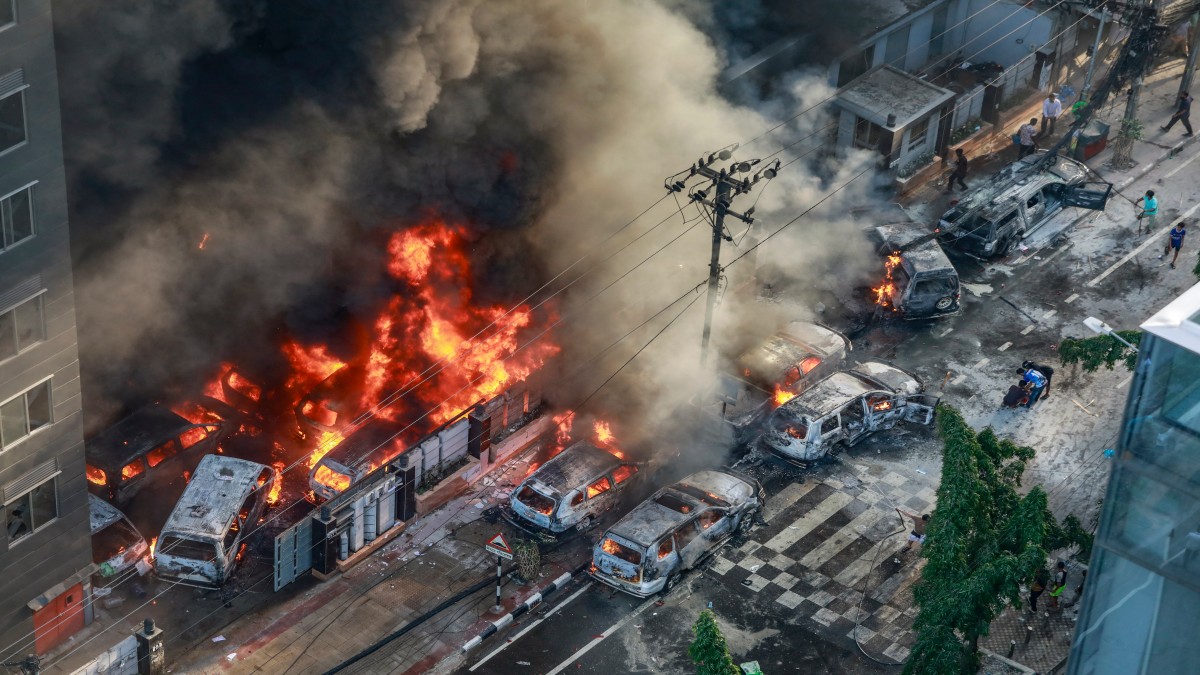Bangladesh Prime Minister Sheikh Hasina has deployed military on the streets of the country to crush protests amid nationwide curfew read more
)
Smoke rises from the burning vehicles after protesters set them on fire near the Disaster Management Directorate office, during the ongoing anti-quota protest in Dhaka. AFP
Protesters in Bangladesh have defied the military deployment and a nationwide curfew to take to the streets against Prime Minister Sheikh Hasina.
The casualties have continued to mount as clashes between the protesters and government forces continued on Saturday. More than 130 deaths have been reported so far.
Even though the morning was calm and streets were largely deserted, the protesters returned to the streets later in the day and clashed with the police.
The clashes occurred even as Bangladeshi military patrolled the streets in the country in armoured vehicles amid a nationwide curfew. Hasina had declared the nationwide clampdown on Friday amid an internet shutdown across the country. Even these measures have failed to crush the protesters who have taken to streets against her on nearly-daily basis this month.
More than 130 killed, over 700 injured
At least 133 people have been killed in clashes between protesters and government forces this week, according to AFP.
Previously, the agency had reported that more than 700 had been injured.
At least 18 deaths were reported in and around capital Dhaka on Saturday, according to the agency.
Of these deaths, 14 were those killed on Saturday and four were those previously admitted to hospitals who succumbed to injuries.
Staff at the Dhaka Medical College Hospital told the agency that two police personnel and nine others were killed on Saturday. In Savar, a major industrial town on the outskirts of Dhaka, three more protesters were killed.
Friday was particularly deadly as more than 50 were killed.
Hasina seeks to crush protests with iron fist
Even though it started as a student protest, it has now turned into a full-fledged movement against Hasina.
For the past 15 years, Hasina has ruled with little opposition to her rule. In the general elections earlier this year, she practically won unopposed as Bangladesh Nationalist Party (BNP), the main Opposition party, had boycotted the elections. The protests, which began against the quota system in the country, have had an anti-Hasina nature since the very beginning.
Even as the United Nations (UN) has urged for restraint, Hasina responded with military might and ordered military deployment on Friday and declared a nationwide curfew. Since Thursday, there has also been an internet shutdown in the country.
Bangladesh is also facing a media blackout of sorts as major newspapers like Dhaka Tribune and Daily Star have their websites down and are not able to update their social media accounts. The state broadcaster Bangladesh Television is also offline as protesters had set its headquarters in Dhaka on fire.
⚠️ Update: Network data show #Bangladesh has now been offline for over 48 hours after authorities impose a nation-scale internet shutdown in a bid to quell student protests ⏱️
The blackout continues to hinder human rights observers and independent media at a critical time. pic.twitter.com/SCEoIjNHZv
The immediate trigger for protests was the public against Bangladesh’s quota system that reserves more than 50 per cent of civil services posts to specific groups, such as the children of veterans of Bangladesh’s war of liberation against Pakistan of 1971.
The critics say the quota system is rigged in favour of Hasina as her family-run Bangladesh Awami League (BAL) was central to the war of liberation and her father Mujibur Rahman was the leader of the movement and was the first president of Bangladesh after the nation was formeed. Hence, the critics say, these seats are effectively reserved for children of Hasina’s supporters.
Protests against the system have also turned into a movement against her as critics have long alleged that the country has seen significant democratic decline during 15 years of her rule. Protesters have been demanding her resignation and have now taken her in her crosshairs instead of just agitating against the quota system.
Pierre Prakash of Crisis Group told AFP that the lack of any alternative in elections has led to the outpouring in the streets.
“With no real alternative at the ballot box, discontented Bangladeshis have few options besides street protests to make their voices heard,” said Prakash.

 2 months ago
23
2 months ago
23
)
)
)
)
)
)
)
)
)
)
)
)
)
)
)
)
)
)
)
)
)
)
)
)
)
 English (US) ·
English (US) ·